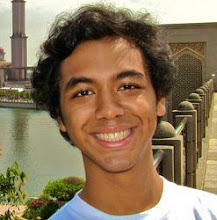My family is very privileged to have mbak Tuti as our domestic helper. She has been with us for more than 10 years and seen my younger brother grow from a teeny-weeny disgusting baby into an aspiring teenage musician. My mom hired her when she was just another newcomer to the Big Durian from a village near Wonogiri, East Java. (Interestingly, my mom also has a helper who had worked for my grandparents since my mom was a baby). She is diligent, smart, and trustworthy; we had no qualms leaving her alone at our home. She can do almost anything my mom didn’t have time to do. During the years, every time my family moved houses, she came along. Every lebaran she goes mudik, and faithfully came back.
During those years too, we witnessed her marriage and first child. In fact, I clearly remember the times I used to spy on her flirting sessions with her then-boyfriend now-husband who was, and still is, a driver. Then they got married and the young family was quickly blessed by the birth of a baby boy. The three of them lives with us and my mom supports the boy’s education. We often eat out together, go for leisure trips, and went to the movies once, where the boy slept through Madagascar 2.
Good help is hard to find, let alone trustworthy ones, so we are determined to maintain our mutualistic relationship. Additional information: the husband developed a small business selling mobile phone credits and snacks on his motorbike. If I may be so bold to coin a new term, I would say she and her husband achieved the Javanese dream, if not Indonesian, of escaping one’s monotonous village and making it –relatively- big in the capital city. In mbak Tuti’s case, she just bought a house in one of Jakarta’s newer suburbs and sends a steady flow of money to her hometown.
It is exactly stories like this that brings throngs of people in the end of the annual mudik season. “Pioneers” share stories of how modern things are here, how everything is bigger and better, and how the streets are paved with gold – which is not true; all we have is a gold-plated eternal flame. Never mind their omitting the sadistic parts such as the life-sucking traffic jams and choking air. Their glamorous stories awed the villagers and prodded them to try their luck here. They will, in turn, become the next Big Durian evangelists who pulls in even more people.
Workforce mobility is naturally beneficial, but in this very case it has brought undesirable effects to the city and the village. According to a data from a national newspaper, an overwhelming majority of the newcomers are unskilled labor. They will land a job in either the informal sector or low-paying workplaces. The effect of this influx is real, unless you can deny the existence of dense slum areas in the city and its associated problems like infectious diseases, high crime rate, and flooding. On the other hand, the village is losing a big part of its workforce. Additionally, as more people leave a village, the culture of that village changes more often in the wrong direction.
If life in the city is so hard, why do villagers keep believing that shiny dream of a city life? From my own observation, there are at least two factors playing a part in this phenomenon: the pull from people who had worked in the city and the willingness to be pulled on the villagers’ part.
First, the people who had moved to Jakarta comes back to their villages and, perhaps unknowingly, exudes a signal that tells everyone to brave the city. Let’s put it this way: one who courageously went to the city and didn’t fail so badly would only share the better experiences of his/her time away from home. It is not so strange if domestic helpers take their pictures with their employers’ homes and cars to boast about it back home. Some mudik-goers also dress the part (fancy clothes, tons of jewelry, inches of make-up) to create the impression that they are prospering in the Big Durian. Those with better income usually take home bundles of small changes to give away to the village kids. This kind of performance never fail to engender the urge to urbanize.
Second, there are intrinsic and extrinsic factors that made the villagers themselves want to try their luck in the city. To begin with, life in the village is not so easy. There may not be enough jobs there, and the ones available are not paying so well or too blah for youngsters. The development in some villages are very slow and the facilities for health care and education is not adequate. Villages that rely on farming is not saved either. Even though Indonesia claims to be an agrarian country, farming is never the priority of our government, who seems to be enamored of factories.
To stop this unhealthy migration, there is nothing the government can do but start closing the development gap between urban and rural areas. They cannot restrict anyone’s movements or deny them the right to (look for) a humane occupation and to fulfill their needs. Until villages and small towns are developed enough for its population, the government should just let the newcomers struggle to get by in the city and extend a helping hand when needed. If they have to live in a slum, let’s at least give them proper health care and get the children in school. If they cannot cope anymore, send them back to their villages.


No comments:
Post a Comment